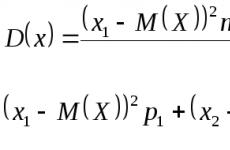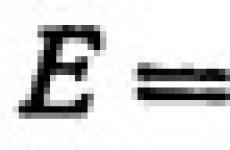Changes in the tax code from August 19. The tax code has been changed: what to expect for taxpayers
The amendments to the Tax Code come into force on August 19, 2017. Federal Law 163 of 07/18/2017 introduces a new article 54.1, which does not allow a taxpayer to reduce tax base and the amount of tax as a result of misrepresentation of information. At cameral and field checks the tax inspector must identify a deliberate violation committed by an official. It is impossible to distort the facts of economic life and information about the objects of taxation.
In this case, the company can reduce the amount of tax if two conditions are simultaneously met:
- the purpose of the transaction is not tax evasion;
- the transaction is carried out by the person specified in the contract or the person to whom the obligation was transferred by law.
The transaction is recognized as real when the taxpayer who made it is found. If the transaction is made and the result is obtained, but the counterparty could not actually do it (lack of employees, the registration address or the founder is massive, there is no relevant staff), then the tax inspector must find the real contractor in order to recognize the transaction as unrealistic. Otherwise, it is recognized as real and cannot be a violation.
Signing primary documents by an unauthorized person, violation by the counterparty of the legislation on taxes and fees, the ability to conduct a transaction with other counterparties separately is not a basis for recognizing the tax reduction as unlawful.
In the letter of the Federal Tax Service dated July 13, 2017 No. ED-4-2 / [email protected]"About direction guidelines on the establishment during tax and procedural audits of circumstances indicating intent in the actions of taxpayer officials aimed at non-payment of taxes (fees)" presents the possible actions of tax inspectors aimed at proving intent to commit an offense.
- Analysis of primary documents (invoices, waybills, contracts) to explain the fictitious document flow scheme aimed at obtaining tax benefits.
- Analysis of non-mandatory documents (correspondence, applications, warehouse books, pass issuance logs, minutes of meetings).
- Re-interrogation of individuals who gave "competing" testimony.
- Priority interrogation of employees who at the time of the audit are not employees of the organization.
- Checking the reality of certificates for goods, the volume of products produced and the relationship between the seller and the manufacturer when reselling goods.
- Checking the persons who receive the goods, spend them in production and make decisions on the purchase when purchasing goods and materials for use within the company.
- Survey of an accountant to identify the facts of reflection in the accounting of fictitious movement of goods.
- Identification of the control function of the manager when posting products in accounting and issuing instructions on their accounting.
- Analysis of information in information resources(EGRLE, EGRN, Tax reporting, Bank accounts, EGRP, traffic police, Gostekhnadzor, GIMS, Rospatent).
The purpose of the audit is to reveal the facts of the fictitious transaction and prove the awareness of officials of the unrealistic costs. To do this, it is necessary to determine the actions or inaction of the officials of the organization that led to the commission of the offense. Tax proves intent simultaneously with the collection of evidence of a tax offense. For this, it is used: obtaining explanations from the taxpayer, interrogations, retrieval of documents, inspections, seizure, sending requests to banks. Also, the guilt of the taxpayer can be proven by the court. The IRS recognizes his decision. If the company's guilt is proved, the penalty for willful non-payment of taxes will increase from 20 to 40 percent of the unpaid tax amount. In addition, such an offense may result in criminal liability.
The article was prepared based on the materials of Chaadaeva O.V., Counsel tax service Russian Federation of the 1st rank, senior lecturer of the Volga Institute for Advanced Studies of the Federal Tax Service of the Russian Federation, member of the Chamber of Tax Consultants of the Russian Federation.
Now the Tax Code of the Russian Federation legalizes the principle of the right to deductions (expenses) for real business transactions, which has long been used in judicial practice in tax disputes.
On August 19, 2017, a new article 54.1 of the Tax Code comes into force (begins to operate). Obviously, these additions to the code were the reason for the appearance of the well-known letter from the Federal Tax Service, which the public perceived as a “ban” on inspections to withdraw VAT deductions and income tax expenses during tax audits. (In our opinion, just the opposite is true.)
The new article of the code quite specifically limits the discretion of the tax authorities when assessing the validity of obtaining a tax benefit in cases of a “defective” primary source - signing by an unauthorized or unknown person, removes the possibility of assessing the expediency of business transactions from the hands of the tax authorities, specifies the distribution of the burden of proof, which undoubtedly should be welcomed.
At the same time, taxpayers should not be mistaken about a significant improvement in their situation: part 1 of the new article of the code contains the term “distortion” in relation to accounting and reporting and tax accounting and reporting, which the code does not disclose.
Obviously, tax administration is being modernized, both methodologically and technologically, which means that the withdrawal of deductions and expenses during tax audits should now be formalized in a much more motivated manner. In any case, this is how the Federal Tax Service explained to the inspectorates their functions and powers.
RUSSIAN FEDERATION
THE FEDERAL LAW
ABOUT CHANGES
TO PART ONE OF THE TAX CODE OF THE RUSSIAN FEDERATION
Article 1
Include in the first part of the Tax Code Russian Federation(Collected Legislation of the Russian Federation, 1998, N 31, Art. 3824; 1999, N 28, Art. 3487; 2003, N 22, Art. 2066; N 23, Art. 2174; N 27, Art. 2700; 2004, N 27, item 2711; N 31, item 3231; N 45, item 4377; 2005, N 45, item 4585; 2006, N 31, item 3436; 2007, N 1, item 28; 2008, N 48, items 5500, 5519; 2009, N 30, item 3739; N 52, item 6450; 2010, N 31, item 4198; N 48, item 6247; N 49, item 6420; 2011, N 1, item 16; N 27, item 3873; N 29, item 4291; N 30, item 4575; N 47, item 6611; N 49, item 7014; 2012, N 27, item 3588; No. 31, article 4333; 2013, No. 9, article 872; No. 26, article 3207; No. 30, article 4081; No. 44, article 5645; No. 52, article 6985; 2014, No. 14, article 1544; N 45, item 6157, 6158; N 48, item 6660; 2015, N 1, item 15; N 10, item 1393; N 18, item 2616; N 24, item 3377; 2016 , N 7, item 920; N 18, item 2486; N 27, items 4173, 4176, 4177; N 49, item 6844) the following changes:
1) supplement Article 54.1 with the following content:
“Article 54.1. Limits on exercising the rights to calculate the tax base and (or) the amount of tax, fee, insurance premiums
1. It is not allowed for a taxpayer to reduce the tax base and (or) the amount of tax payable as a result of distorting information about the facts of economic life (the totality of such facts), about the objects of taxation subject to reflection in the tax and (or) accounting or tax reporting of the taxpayer.
2. In the absence of the circumstances provided for by paragraph 1 of this article, for the transactions (operations) that have taken place, the taxpayer has the right to reduce the tax base and (or) the amount of tax payable in accordance with the rules of the relevant chapter of part two of this Code, subject to the following conditions:
1) the main purpose of the transaction (operation) is not non-payment (incomplete payment) and (or) offset (refund) of the amount of tax;
2) the obligation under a transaction (operation) has been fulfilled by a person who is a party to an agreement concluded with a taxpayer and (or) by a person to whom the obligation to execute a transaction (operation) has been transferred under an agreement or law.
3. For the purposes of paragraphs 1 and 2 of this article, the signing of primary accounting documents by an unidentified or unauthorized person, violation by the taxpayer's counterparty of the legislation on taxes and fees, the possibility of the taxpayer obtaining the same result of economic activity when making other transactions (operations) not prohibited by law cannot be considered as an independent basis for recognizing the reduction by the taxpayer of the tax base and (or) the amount of tax payable as unlawful.
4. The provisions of this article shall also apply to fees and insurance premiums and apply to fee payers, insurance premium payers and tax agents.”;
August 19, 2017 comes into force new edition Tax Code of the Russian Federation. Legislators have determined the limits for the exercise by taxpayers of the rights to calculate the tax base and the amount of taxes, fees or insurance premiums. In addition, the features of determining tax periods for newly created individual entrepreneurs are established.
The wording of part one of the Tax Code of the Russian Federation was changed immediately by two new laws that come into force on August 19, 2017:
Federal Law No. 163-FZ of July 18, 2017;
Federal Law No. 173-FZ of July 18, 2017.
The first of them introduced the so-called presumption of good faith of taxpayers, setting limits on the exercise of their rights to calculate the tax base and the amount of taxes, fees or insurance premiums. The second law establishes features for determining tax periods for newly registered individual entrepreneurs.
New obligations of taxpayers and regulatory authorities
A new one has been added to the Tax Code, which determined the limits for exercising the rights to calculate the tax base and (or) the amount of tax, fee, insurance premiums. According to its norms, taxpayers cannot reduce the tax base and (or) the amount of tax payable as a result of distorting information about the facts of economic life (the totality of such facts), about the objects of taxation that are subject to reflection in the tax and (or) accounting or tax reporting of the taxpayer. Such a reduction is possible only in accordance with the rules of the relevant chapter of part two of the Tax Code of the Russian Federation, subject to the following conditions:
- the main purpose of the transaction (operation) is not non-payment (incomplete payment) and (or) offset (refund) of the amount of tax;
- the obligation under a transaction (operation) has been fulfilled by a person who is a party to an agreement concluded with a taxpayer and (or) by a person to whom the obligation to execute a transaction (operation) has been transferred under an agreement or law.
Paragraph 3 of the same article of the Tax Code of the Russian Federation determines that if the primary accounting documents are signed by an unidentified or unauthorized person, the taxpayer's counterparty violated the requirements of the legislation on taxes and fees, and the taxpayer could receive the same result of economic activity when making other transactions (operations) not prohibited by law , the Federal Tax Service authorities cannot consider this as an independent basis for recognizing the reduction by the taxpayer of the tax base or the amount of tax payable as unlawful.
Supplemented by paragraph 5 of the following content:
Proof of the circumstances provided for in paragraph 1 of Article 54.1 of the Tax Code of the Russian Federation and (or) the fact of non-compliance with the conditions provided for in paragraph 2 of Article 54.1 of the Tax Code of the Russian Federation is carried out by the tax authority when carrying out tax control measures in accordance with sections V, V.1, V.2 of this Code .
Taxable period
Legislators made significant changes to it, several new clauses appeared at once, regulating the features of determining tax periods for new individual entrepreneurs and organizations. In particular, it is determined that if the state registration of an individual as an individual entrepreneur was carried out in the period from January 1 to November 30 of one calendar year, then the first tax period for such an individual entrepreneur is the period of time from the date of state registration of an individual as an individual entrepreneur to December 31 of this calendar year. If the IP was registered in the period from December 1 to December 31 of one calendar year, then the first tax period for it will be the period from the date of state registration to December 31 of the calendar year following the year the IP was created.
In addition, legislators have established that upon termination of individual activities as an individual entrepreneur, the last tax period for him is the period of time from January 1 of the calendar year in which the state registration of an individual as an individual entrepreneur became invalid until the day of state registration of this event. But if the state registration of an individual as an individual entrepreneur was carried out and became invalid during the calendar year, then the tax period for him is the period from the date of state registration until the state registration of an individual as an individual entrepreneur becomes invalid.
Also, a new paragraph 3.1 has been added to the article with the following content:
If, in accordance with part two of this Code, a quarter is recognized as a tax period for the relevant tax, the dates of the beginning and end of the tax period are determined taking into account the provisions established by this paragraph and paragraph 3.2 of Article 55 of the Tax Code of the Russian Federation.
Another new paragraph 3.2 of this article, in particular, says that when an organization is terminated by liquidation or reorganization, or if an individual terminates activities as an individual entrepreneur, the last tax period for such an organization (such an individual entrepreneur) is the period of time from the beginning of the quarter in which the organization was terminated or the state registration of the individual entrepreneur became invalid, before the day of the state registration of the corresponding event.
The words “business purpose”, “unreasonable tax benefit”, “due diligence”, “good faith” have become so tightly embedded in the life of an ordinary Russian entrepreneur that, perhaps, he will explain their meaning no worse than any tax inspector. And after attending the next tax seminar, instead of planning a new production line, he will begin to draw in his imagination a weighty justification (with figures, graphs, convincing evidence) of the need to attract a new counterparty.
Almost not a single act of a tax audit, not a single court decision can do without mentioning the very unjustified tax benefit that caused damage to the budget. And this concept was introduced already more than 10 years ago - by the Resolution of the Supreme Arbitration Court No. 53 of 12.10.2006. The Supreme Arbitration Court has since sunk into oblivion, merging with Supreme Court, and the concept he developed is alive.
But, whether it is undignified to refer to a court ruling (after all, we do not have England with its case law), or vague concepts of good faith are outdated, it was decided to be consistent with the provisions in the Tax Code of the Russian Federation. On July 18, 2017, the verified amendments to the code were signed by the President. A new article 54.1 was born. The new rules will apply to audits scheduled after August 19, 2017.
This means that all transactions for the period 2014-2016 and beyond can be assessed against the new criteria.
Let's just say that the revolution did not happen. The law in a concise, devoid of emotional coloring form contains provisions that reflect the meaning of the already familiar search for a “business goal”, proving the validity of a tax benefit, in order to exclude an evaluative approach to judgments about the behavior of a taxpayer. Suppose that the courts gradually move from citing Decree No. 53 to referring to the law. How this will affect the statistics of tax disputes - time will tell.
So, firstly, instead of the presumption of good faith of the taxpayer and the presumption of reliability of information in accounting and tax reporting, the law states:
“It is not allowed for a taxpayer to reduce the tax base and (or) the amount of tax payable as a result of distorting information about the facts of economic life, about objects of taxation” in tax and / or accounting.
The code does not use such a familiar concept of “tax benefit”. However, speaking about the inadmissibility of distorting information to reduce the tax base and / or the amount of tax, the legislator has in mind what was previously considered an unreasonable tax benefit.
Secondly, if all the information in the reporting is taken into account correctly, the next test for the taxpayer will be to check whether two conditions are met simultaneously (clause 2 of article 54.1):
- reducing the amount of tax liabilities is not the only purpose of the transaction;
- the obligation under the transaction is fulfilled by the person declared by the party to the agreement, or by the person to whom the obligation has been transferred by law or agreement (for example, under an assignment agreement, by succession, etc.).
The first condition is nothing more than the "business purpose" of the transaction, which should not be solely related to the reduction of tax liabilities.
Sometimes one hears such an answer to the question of the advisability of creating two sales companies using the simplified tax system: “If all the turnovers are in one company, it will not be able to apply the simplified tax system because of the turnover, and the business will become unprofitable.” Remember: this is an example of sincere recognition for the tax authority - an entrepreneur has no other goal than compliance with the conditions for applying a special tax regime.
If we are talking about geographically isolated sales departments, different target categories of customers, different management teams, and even competing in performance, then the effect of applying a reduced tax rate is no longer paramount.
The second condition says that the transaction must be executed by the person indicated in the documents. Or by another, to whom the obligation to fulfill the transaction has passed by law or contract. That is, not some unidentified third party.
The condition is extremely important, as it can reverse the trend that has developed in the interests of the taxpayer of “establishing the actual amount of the tax benefit” when it comes to income tax. Recall that back in 2012, the Supreme Arbitration Court ruled:
The actual amount of the expected tax benefit and costs incurred by the taxpayer in calculating income tax is to be determined based on market prices applied for similar transactions.
A different legal approach entails a distortion of the real amount of tax liabilities for income tax ...
Decree of the Presidium of the Supreme Arbitration Court of the Russian Federation No. A71-13079 / 2010-A17 of 07/03/2012
This led to the fact that the tax authority ceased to challenge the accounting of costs by the taxpayer when it could not prove the overestimation of the cost. For example, the house is built - it means there were bricks; food products have been released and its composition can be checked only after an expensive examination - the cost of meat, flour, other ingredients is accepted, etc. We emphasize that it was only about income tax, but at least in this part the taxpayer could be calm.
After the amendments come into force, if the tax authority questions the possibility of executing a transaction, for example, for the delivery of a specific raw material by a specific counterparty, the costs may be excluded when calculating income tax. Only the practice of applying the new provisions will show whether the taxpayer will still be able to claim that the raw materials (materials, components) were actually and really used in the production, construction or provision of services, despite the lack of evidence of a relationship with a particular supplier. Compliance with the principles listed above will allow the taxpayer to emerge victorious from the tax dispute.
To make this easier than it seems, the law provides for circumstances that by themselves cannot confirm the wrongness of the taxpayer (clause 4 of article 54.1 of the Tax Code of the Russian Federation):
- signing of primary documents by an unidentified or unauthorized person.
A similar approach was reflected in the letter of the Federal Tax Service of Russia dated March 23, 2017 No. ED-5-9-547, which mentioned the urgent problem of implementing tax authorities formal collection of evidence for the purpose of confirming the receipt by the taxpayer of an unjustified tax benefit. Very often, the tax authorities do not dispute the reality of transactions with counterparties, but simply limit themselves to arguments about the unreliability of primary documents, based on interrogations of the heads of counterparties who declared that they were not involved in the activities of companies, and handwriting examinations. In this regard, the Federal Tax Service of Russia stated that the fact that the interrogated persons denied signing documents on behalf of counterparties or that they have the authority of a manager is not an unconditional and sufficient basis for concluding that the taxpayer has received an unjustified tax benefit. - violation by the counterparty of the taxpayer of tax legislation. If the documents were drawn up by the supplier perfectly, the goods were delivered (services were provided), and there was no doubt that they were necessary for real economic activity, but it suddenly turned out that the counterparty stopped paying taxes, the taxpayer being checked cannot be held responsible for this. Undoubtedly, fixing this rule in the law will be to the benefit of taxpayers;
- the possibility for the taxpayer to obtain the same result of economic activity when making other transactions (operations) not prohibited by law. Also, the long-established rule that entrepreneurial activity is carried out at your own risk, and retroactively indicating that the transaction turned out to be unprofitable, useless, and other suppliers were on the market, the tax inspector is not entitled.
Thus, the legislators have done a multi-stage work in which they were looking for different variants fixing in the code what has developed in practice. They started with attempts to find a universal definition of "abuse of the right", but came to extremely laconic formulations, devoid of room for evaluation and subjectivity.
However, the gains of conscientious taxpayers were not ignored. If there is a business goal, confirmed the expediency of the concluded transactions and their actual execution, additional taxes will be untenable.
Federal Law No. 163-FZ of July 18, 2017 "On Amendments to Part One of the Tax Code of the Russian Federation" (effective from August 19, 2017).
Article 1
Include in part one of the Tax Code of the Russian Federation (Sobraniye zakonodatelstva Rossiyskoy Federatsii, 1998, No. 31, Art. 3824; 1999, No. 28, Art. 3487; 2003, No. 22, Art. 2066; No. 23, Art. 2174; No. 27 , item 2700; 2004, No. 27, item 2711; No. 31, item 3231; No. 45, item 4377; 2005, No. 45, item 4585; 2006, No. 31, item 3436; 2007, No. 1 2008, No. 48, items 5500, 5519; 2009, No. 30, item 3739; No. 52, item 6450; 2010, No. 31, item 4198; No. 48, item 6247; No. 49 , item 6420; 2011, No. 1, item 16; No. 27, item 3873; No. 29, item 4291; No. 30, item 4575; No. 47, item 6611; No. 49, item 7014; 2012 , No. 27, item 3588; No. 31, item 4333; 2013, No. 9, item 872; No. 26, item 3207; No. 30, item 4081; No. 44, item 5645; No. 52, item 6985; 2014, No. 14, item 1544; No. 45, item 6157, 6158; No. 48, item 6660; 2015, No. 1, item 15; No. 10, item 1393; No. 18, item 2616; No. 24, Article 3377; 2016, No. 7, Article 920; No. 18, Article 2486; No. 27, Articles 4173, 4176, 4177; No. 49, Article 6844) the following changes:
1) supplement Article 54 1 with the following content:
Article 54 1
1. It is not allowed for a taxpayer to reduce the tax base and (or) the amount of tax payable as a result of distorting information about the facts of economic life (the totality of such facts), about the objects of taxation subject to reflection in the tax and (or) accounting or tax reporting of the taxpayer.
2. In the absence of the circumstances provided for by paragraph 1 of this article, for the transactions (operations) that have taken place, the taxpayer has the right to reduce the tax base and (or) the amount of tax payable in accordance with the rules of the relevant chapter of part two of this Code, subject to the following conditions:
1) the main purpose of the transaction (operation) is not non-payment (incomplete payment) and (or) offset (refund) of the amount of tax;
2) the obligation under a transaction (operation) has been fulfilled by a person who is a party to an agreement concluded with a taxpayer and (or) by a person to whom the obligation to execute a transaction (operation) has been transferred under an agreement or law.
3. For the purposes of paragraphs 1 and 2 of this article, the signing of primary accounting documents by an unidentified or unauthorized person, violation by the taxpayer's counterparty of the legislation on taxes and fees, the possibility of the taxpayer obtaining the same result of economic activity when making other transactions (operations) not prohibited by law cannot be considered as an independent basis for recognizing the reduction by the taxpayer of the tax base and (or) the amount of tax payable as unlawful.
4. The provisions of this article shall also apply to fees and insurance premiums and apply to fee payers, insurance premium payers and tax agents.";
2) Article 82 shall be supplemented with paragraph 5 of the following content:
"5. Proof of the circumstances provided for in paragraph 1 of Article 54 1 of this Code, and (or) the fact of non-compliance with the conditions provided for in paragraph 2 of Article 54 1 of this Code, is carried out by the tax authority when carrying out tax control measures in accordance with sections V, V 1 , V 2 of this Code."
Article 2
1. This Federal Law shall enter into force one month after its official publication.
2. The provisions of clause 5 of article 82 of part one of the Tax Code of the Russian Federation (as amended by this federal law) apply to cameral tax audits tax returns(calculations) submitted to the tax authority after the effective date of this Federal Law, as well as on-site tax audits and audits of the completeness of the calculation and payment of taxes in connection with the transactions between related parties, decisions on the appointment of which were made by the tax authorities after the effective date of this federal law.
The president
Russian Federation
V.Putin
As a result of the changes, provisions on unjustified tax benefits have been added to the Tax Code of the Russian Federation, defining situations when a taxpayer is not entitled to receive tax deduction and or expenses to be taken into account for tax purposes, even if there are "formally correct" primary documents.
Manifestation of unjustified tax benefit in 2017 and earlier may be expressed as
- in unfair competition in the tax sphere;
- cooperation with one-day companies, offshore companies;
- erosion of the tax base;
- unjustified use of tax breaks, benefits, etc.
- According to the aforementioned resolution of the Plenum of the Supreme Arbitration Court of Russia dated October 12, 2006 No. 53 “On the assessment by arbitration courts of the validity of obtaining a tax benefit by a taxpayer”, an unjustified tax benefit arises when a tax liability is reduced by various actions, the composition of which is not exhaustive.
We can talk about obtaining unreasonable tax benefits in 2017 if:
- The right to receive it is not documented.
- The tax authorities proved that the information in the submitted documents:
- incomplete;
- do not correspond to reality;
- contain contradictions.
That is, the generally accepted principle applies: the tax benefit is justified until proven otherwise. In fact, the new rules are about combating aggressive methods of optimizing the tax burden, which lead to:
- non-fulfillment or incomplete fulfillment of obligations to pay taxes;
- obtaining the right to a tax refund - refund / offset.
What's new
Since 2017, the concept of "unjustified tax benefit" has been governed by the provisions of Article 54.1 of the Tax Code of the Russian Federation "Limits for exercising the rights to calculate the tax base and (or) the amount of tax, fee, insurance premiums". In particular:
- It is expressly prohibited to reduce the tax base and / or tax payable by distorting information:
- about the facts of economic life (the totality of such facts);
- on objects of taxation to be reflected in tax and / or accounting, tax reporting.
- In the absence of the facts listed above, for the transactions / operations that have taken place, the payer may reduce the tax base and / or the amount of tax in accordance with the provisions of the relevant chapter of the Tax Code of the Russian Federation, subject to the following conditions:
- 1) the main purpose of the transaction/operation is not the non-payment/underpayment and/or offset/refund of tax;
- 2) the obligation under the transaction has been fulfilled by a party to an agreement concluded with a taxpayer and/or by a person to whom it has been transferred by virtue of an agreement or law.
- 3 In view of the foregoing, the following cannot be considered as separate grounds and as unlawful reduction by the payer of the tax base and / or the amount of tax payable:
- signing of the "primary" by an unknown or unauthorized person;
- violation of tax laws by the counterparty;
- the possibility for the payer to obtain the same economic result when making other transactions and operations not prohibited by law.
- fees;
- contributions to off-budget funds;
- fee payers;
- payers of insurance premiums;
- tax agents.






